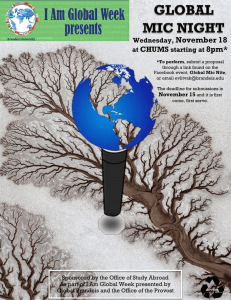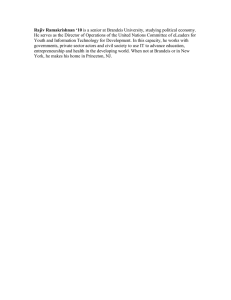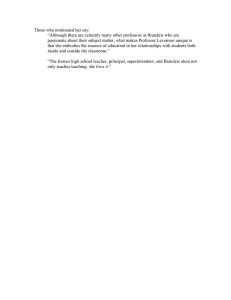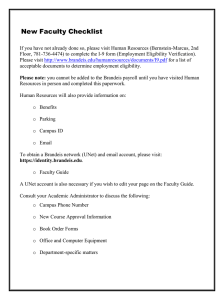Preliminary Framework for the Strategic Plan
advertisement
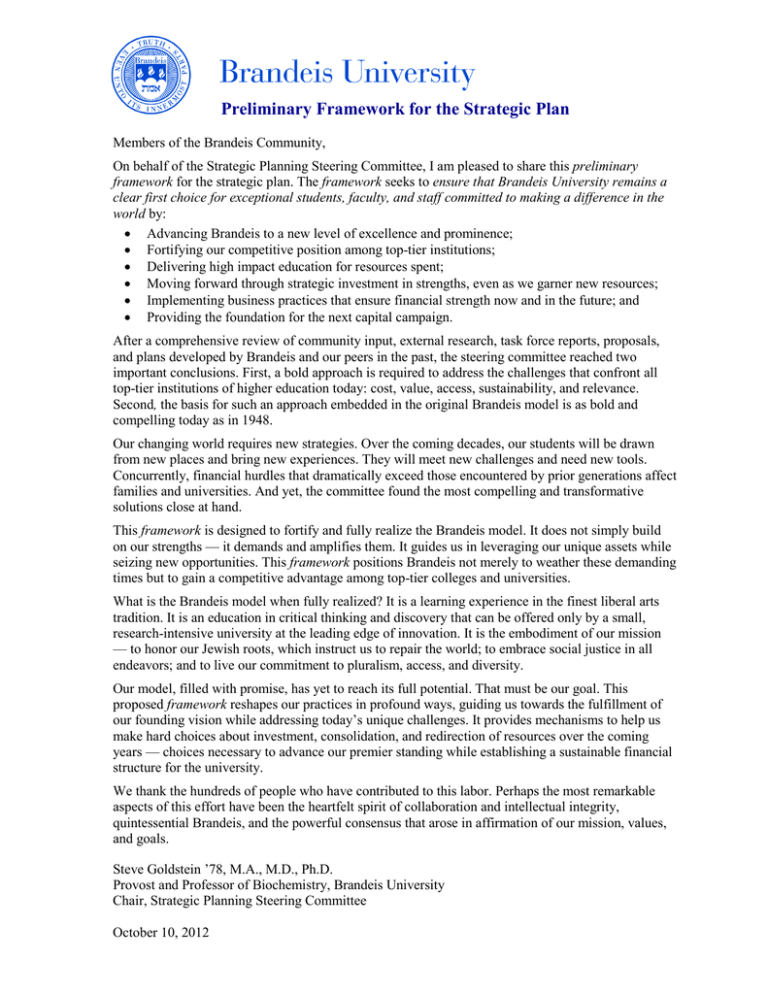
Preliminary Framework for the Strategic Plan Members of the Brandeis Community, On behalf of the Strategic Planning Steering Committee, I am pleased to share this preliminary framework for the strategic plan. The framework seeks to ensure that Brandeis University remains a clear first choice for exceptional students, faculty, and staff committed to making a difference in the world by: • Advancing Brandeis to a new level of excellence and prominence; • Fortifying our competitive position among top-tier institutions; • Delivering high impact education for resources spent; • Moving forward through strategic investment in strengths, even as we garner new resources; • Implementing business practices that ensure financial strength now and in the future; and • Providing the foundation for the next capital campaign. After a comprehensive review of community input, external research, task force reports, proposals, and plans developed by Brandeis and our peers in the past, the steering committee reached two important conclusions. First, a bold approach is required to address the challenges that confront all top-tier institutions of higher education today: cost, value, access, sustainability, and relevance. Second, the basis for such an approach embedded in the original Brandeis model is as bold and compelling today as in 1948. Our changing world requires new strategies. Over the coming decades, our students will be drawn from new places and bring new experiences. They will meet new challenges and need new tools. Concurrently, financial hurdles that dramatically exceed those encountered by prior generations affect families and universities. And yet, the committee found the most compelling and transformative solutions close at hand. This framework is designed to fortify and fully realize the Brandeis model. It does not simply build on our strengths — it demands and amplifies them. It guides us in leveraging our unique assets while seizing new opportunities. This framework positions Brandeis not merely to weather these demanding times but to gain a competitive advantage among top-tier colleges and universities. What is the Brandeis model when fully realized? It is a learning experience in the finest liberal arts tradition. It is an education in critical thinking and discovery that can be offered only by a small, research-intensive university at the leading edge of innovation. It is the embodiment of our mission — to honor our Jewish roots, which instruct us to repair the world; to embrace social justice in all endeavors; and to live our commitment to pluralism, access, and diversity. Our model, filled with promise, has yet to reach its full potential. That must be our goal. This proposed framework reshapes our practices in profound ways, guiding us towards the fulfillment of our founding vision while addressing today’s unique challenges. It provides mechanisms to help us make hard choices about investment, consolidation, and redirection of resources over the coming years — choices necessary to advance our premier standing while establishing a sustainable financial structure for the university. We thank the hundreds of people who have contributed to this labor. Perhaps the most remarkable aspects of this effort have been the heartfelt spirit of collaboration and intellectual integrity, quintessential Brandeis, and the powerful consensus that arose in affirmation of our mission, values, and goals. Steve Goldstein ’78, M.A., M.D., Ph.D. Provost and Professor of Biochemistry, Brandeis University Chair, Strategic Planning Steering Committee October 10, 2012 Highlights The framework anticipates a future where – • All Brandeis students will experience a highly personal education with opportunities to engage in real-world discovery and creation with a degree of intensity that can be realized only at a small, research-intensive university at the leading edge of innovation. • All Brandeis programs will be known for their distinction and ability to attract extraordinary faculty and students from around the world. • Empowered professional and research enterprises will conspicuously increase their competitiveness for funding, partnerships, and awards of recognition. • All schools, departments, programs, centers, and institutes will be linked in unprecedented ways to leverage capacities across the institution, to create new integrated programs, and to increase student access to the plethora of educational resources available on campus. • Our community will deepen its commitment to social justice, building our diversity of peoples and ideas, and growing our international engagement. • An energized alumni network will embrace lifelong engagement and be deeply involved in advising, mentoring, and opening doors for our students in all parts of the world. • Robust technology will support flexible programming for students – on and off campus, at home and abroad, with full and part-time schedules – enable new faculty calendars for teaching and scholarship, and generate new revenue streams. • New initiatives could include Biomedicine & Global Health, Engineering, Integrated Arts, Legal & Ethical Studies, and a World Issues Forum dedicated to social justice, that combine strengths across our schools, centers, and institutes. • Our campus and facilities will be modernized and maintained making choices that favor repurposing and sustainability, flexibility and technology, value and beauty. • Our investment and reallocation choices will be based on excellence that distinguishes Brandeis from its peers, offers students a range of truly great programs, and enhances the competitive position of our schools. • Our financial resource base will grow and provide stable revenue to support the mission now and in the future. This will result from improved operations and policies, engaging the creative and entrepreneurial efforts of our faculty and staff, and strengthened by significant ongoing support from our students, families, alumni, and friends. 2 Preliminary Framework For the Strategic Plan Table of Contents Pages 4 Executive Summary 5-9 Preliminary Framework for the Strategic Plan Strategic Directions and Strategies Our Academic Experience Our Discovery Enterprise Our Community Our Campus and Technology Our Stewardship 10 Appendix I Strategic Planning Process 11 Appendix II Strategic Planning Steering Committee 12-14 Appendix III Strategic Planning Task Forces 3 Executive Summary Preliminary Framework For the Strategic Plan Strategic Directions and Strategies Our Academic Experience Brandeis will be known as a place where students prepare for futures not yet imagined — where theory is linked with practice, education is transformative, moral courage is fostered, and social justice is a way of life. Transform Undergraduate and Graduate Education Make Personal and Flexible Education a Hallmark Our Discovery Enterprise Brandeis will be renowned for asking big questions and connecting them to action — for promoting discovery as a core value, nurturing creativity, and fostering teamwork in search of answers that improve the world for others. Empower Programs of Distinction – Existing and New Stimulate and Facilitate Discovery Our Community Brandeis will grow its ability to project into the world, forming with our alumni and friends a diverse multigenerational community engaged and connected on campus and around the globe and committed to social justice as a way of life. Celebrate Our Distinctiveness Build a Highly Interconnected Global Brandeis Community Tell the Brandeis Story Our Campus and Technology Brandeis will modernize and maintain its campus consonant with its values; plans will favor repurposing and sustainability, flexibility and technology, worth and beauty. Create Campus Spaces and Facilities that Enable and Inspire Apply Innovative Technologies to Learning and Discovery Our Stewardship Brandeis will ensure its financial strength now and into the future through targeted investments in excellence, superior business practices, and community-wide engagement in mission-based entrepreneurial and philanthropic efforts. Invest in Uncommon Excellence Commit to Financial Stability Strengthen a Culture of Stewardship 4 Preliminary Framework For the Strategic Plan Strategic Directions and Strategies Our Academic Experience Brandeis will be known as a place where students prepare for futures not yet imagined – where theory is linked with practice, education is transformative, moral courage is fostered, and social justice is a way of life. Transform Undergraduate and Graduate Education Commitment: Every student will experience a highly individualized education filled with opportunities to engage in real-world discovery and creation with a degree of intensity that can be realized only at a small, research-intensive university at the leading edge of innovation. To do this we will: • Commit to offering high-quality, innovative programs worthy of the Brandeis reputation for rigor and excellence • Engage remarkable educators who push the limits of their disciplines and know that discovery is the most potent method to embolden students to answer world challenges • Link our teaching and research in unprecedented ways within and across schools, centers, and institutes to increase student access to vanguard opportunities • Restructure our learning and teaching model to allow for more intensive educational experiences and research time • Emphasize the arts and humanities as essential forms of discovery • Engage the liberal arts and social justice to teach critical thinking and shape research Make Personal and Flexible Education a Hallmark Commitment: Every student will be provided individual guidance and support, and a flexible program of study, to facilitate an academic experience that is excellent, and also designed to advance their personal and career goals. To do this we will: • Provide top-notch personalized advising for every student, spanning from admission to post-Brandeis placements and support for alumni • Provide a range of opportunities to complete combined degrees in less time, allowing for greater access to learning experiences for undergraduates in the graduate and professional schools • Engage our extended alumni community as mentors and advisors, and to connect our students to the working world • Create pathways to degrees that improve access for non-traditional students • Commit to technology as an essential part of an effective and flexible delivery model, fostering online learning and new learning strategies 5 Our Discovery Enterprise Brandeis will be renowned for asking big questions and connecting them to action — for promoting discovery as a core value, nurturing creativity, and fostering teamwork in search of answers that improve the world for others. Empower Programs of Distinction — Existing and New Commitment: We will empower programs that extend our current capacities, link theory and practice, and prepare students to be leaders who change the world. To do this we will: • Intensify programs of national distinction and those that are nearly in this group • Sustain, as needed, programs required to meet standards or to support distinction • Evaluate where supporting, distinctive, and new programs can benefit from consolidation and partnership within and beyond Brandeis • Inspire competition to identify new areas of distinction that build on our strengths • Invest in the professional schools to increase their competitiveness Superior academic assets in the five schools and international recognition in the arena of social justice allow Brandeis to seriously consider five world-class interdisciplinary programs with limited investments that can later grow to full potential. Brandeis can lead and serve as a convening venue for experts by designing programs that differentiate. • Biomedicine and Global Health — linking programs of exceptional distinction, we become the leaders on the “science-practice gap,” a singular opportunity to bridge basic science and technology to health policy, management, sustainability, and economics • Engineering — a focus on real-world problems and alliances with U.S., Israeli, and Indian peers allows us to offer certified training with funds required also to maintain our top-tier distinction in sciences. Brandeis prowess in the life sciences is differentiating. • Integrated Arts — a novel program that links the creative arts to one another as well as to the sciences, humanities, social sciences and programs in social justice; and provides for essential growth in theatre, film, music, and visual arts, including the Rose Art Museum • Legal and Ethical Studies — linking all five schools to enhance the undergraduate curriculum and to confer graduate degrees requires limited initial resources. A natural and powerful fit, it can grow rapidly with a strong Board of Advisors and marketing plan • World Issues Forum — a center dedicated to the law and ethics of social justice, linked to the curriculum, seeking solutions to global challenges through balanced, high-level discourse, advancing our role, and attracting students who share this passion Stimulate and Facilitate Discovery Commitment: Brandeis will move up among the top-tier institutions with global impact because faculty-led discovery is how we educate and address big questions of our time. To do this we will: • Ensure that paradigm-shifting creativity and discovery are held as vital core values in the arts, humanities, natural sciences, social sciences, and professional programs • Attract and retain a diverse group of brilliant faculty members who are among those rare intellectuals who confront the major challenges of their generation and know that educating future leaders is our most powerful and long-lasting strategy to repair the world • Ensure that those areas that make Brandeis distinctive thrive by achieving critical mass of faculty through targeted and cohort hires • Build and maintain core services and high-quality facilities for creation and discovery • Build a critical mass of doctoral students and postdoctoral trainees only in those areas that make Brandeis distinctive • Strengthen entrepreneurial efforts to obtain external funding for creation and discovery 6 Our Community Brandeis will grow its ability to project into the world, forming with our alumni and friends a diverse multigenerational community engaged and connected on campus and around the globe and committed to social justice as a way of life. Celebrate Our Distinctiveness Commitment: Brandeis will embrace what makes it unique and extraordinary, and build on its core values of social justice, moral courage, and inclusion. To do this we will: • Deepen campus commitment to social justice through action and scholarship, broaden our diversity of peoples and ideas, and foster our international engagement • Build community interactions that create pride and spirit • Improve the physical and emotional health of our community Build a Highly Interconnected Global Brandeis Community Commitment: Brandeis will strengthen connections among our constituencies, across generations and continents, linking our alumni to the campus and each other throughout their lives. To do this we will: • Develop an energized alumni network that embraces lifelong engagement with Brandeis and with each other • Ensure that alumni are deeply involved in advising, mentoring, and opening doors for our students in all parts of the world • Create physical and online networks among students on campus, offsite and online students, and non-traditional students Tell the Brandeis Story Commitment: Brandeis will build national and international recognition and a compelling case for the University as a first choice for students, faculty, and staff committed to making a difference in the world. To do this we will: • Share the Brandeis story widely, making a compelling case for distinctiveness through a comprehensive communications, marketing, and recruitment plan • Be acknowledged as top-tier through recognition of the five schools • Be well known for the significant accomplishments of individual faculty members, students, and graduates • Be recognized as influential and unique as the only small liberal arts, research-intensive institution in the elite Association of American Universities • Be celebrated for our commitment to social justice within and beyond the campus 7 Our Campus and Technology Brandeis will modernize and maintain its campus consonant with its values; plans will favor repurposing and sustainability, flexibility and technology, worth and beauty. Create Campus Spaces and Facilities that Enable and Inspire Commitment: Brandeis will renew the campus master plan to reflect aspirations in spaces and facilities that enhance our distinctive approach to education, discovery, and community. To do this we will: • Ensure that new and existing programs of distinction receive needed capital investment over time to succeed • Create collaborative facilities as “hubs” and provide flexible spaces for education and discovery within disciplines and spanning the activities of the institution • Remove barriers to student satisfaction by matching campus capacity to enrollment, and raising the quality and accessibility of residential and academic facilities • Strengthen market position and competitive success by careful campus planning • Remain sensitive to sustainability by preserving and enhancing existing facilities with adaptive re-use and environmentally responsible design and construction Apply Innovative Technologies to Learning and Discovery Commitment: Brandeis will effectively utilize technology over the next decade in ways that support education and discovery, enable flexibility for our students and faculty, connect our global community, and generate new revenue. To do this we will: • Build on the work of the Rabb School of Continuing Studies, the Heller School for Social Policy and Management, and Library and Technology Services • Create a well-integrated technological infrastructure for teaching and discovery for students, faculty, staff, and alumni on campus and around the globe • Integrate technological potential in the process of curriculum design and assessment and in the planning of new programs • Develop new models for discovery-based learning and allow new faculty calendars for teaching and scholarship • Generate hybrid and distance learning programs for summer and intersession • Produce “executive” distance learning programs 8 Our Stewardship Brandeis will ensure its financial strength now and into the future through targeted investments in excellence, superior business practices, and communitywide engagement in mission-based entrepreneurial and philanthropic efforts. Invest in Uncommon Excellence Commitment: Investments and reallocations will be based on excellence that distinguishes Brandeis from its peers, offers students an appropriate range of truly great programs, and enhances our market position. To do this we will: • Target funds to academic units (schools, departments, programs, centers, and institutes) to intensify what is first tier, to strengthen what is nearly superb, and to sustain, as needed, what is required to meet standards or to support areas of excellence • Encourage new areas of distinction by funding selected proposals for innovative educational and research programs • Formally evaluate academic units for scholarly impact and distinction • Apply financial criteria to the assessment of new and existing programs • Consolidate internal programs and seek collaborations outside the institution to empower programs of excellence and to maintain those required to meet standards Commit to Financial Stability Commitment: Financial operations will be based on agreed-upon principles that support a strong and stable platform and that enable Brandeis to achieve its full potential. To do this we will: • Improve budgeting practices and maintain a resilient investment strategy • Formally evaluate administrative units for cost-effectiveness and service • Grow endowment while simultaneously investing in innovation and excellence • Establish an effective debt policy • Ensure that quality, mission, and values guide our financial practices and policies • Maintain our historic commitment to affordability and access, while making certain that are commitments are supported in a financially sustainable manner Strengthen a Culture of Stewardship Commitment: We will build a strong, multifaceted community of individuals and institutions who actively support and invest in the future of Brandeis. To do this we will: • Enhance a culture of lifelong engagement and partnership within the Brandeis community and among our friends worldwide • Achieve new levels of financial support from current and prospective donors 9 Appendix I Strategic Planning Process In November 2011, President Fred Lawrence launched a strategic planning process for the purpose of setting a 10+ year trajectory for Brandeis University. He asked Steve Goldstein, Provost and Professor of Biochemistry, to lead the process and Chair the Strategic Planning Steering Committee (SPSC). The SPSC has engaged 27 members representing all corners of the Brandeis community, including faculty from all schools and disciplines, board members, students, staff, and administrators. Many members of the SPSC are Brandeis Alumni. The SPSC invited the entire community to engage in the information-gathering phase of this effort. As a result, over 500 community members, from all our constituencies, came together on campus and off campus, in town-hall meetings and small group sessions, and during existing committee meetings. Personal and online input was also gathered. Studies were solicited, for example, on external factors likely to impact Brandeis. Prior planning exercises by Brandeis and our peers were reviewed. Faculty, students, and alumni also submitted proposals, studies, and concept documents on their own accord. The SPSC, despite its size, found remarkable consensus at each stage of the process. Based on the information-gathering sessions and the initial discussions of the strengths and potential of the institution, the SPSC agreed universally to the following guiding principles: • • • Brandeis will remain a research university with a liberal arts focus. Brandeis will continue to embrace social justice in its education and research endeavors. Brandeis will honor its Jewish roots and commitment to pluralism, access, and diversity. In January 2012, the Strategic Planning Financial Task Force was formed to make recommendations focused on strengthening the Brandeis financial and business model, and to provide a financial lens for the planning process, ensuring a plan grounded in financial realities. Their work will continue throughout the life of the process. In May 2012, the steering committee created 11 task forces that were charged to study issues where deeper understanding was judged to be necessary for the planning effort. Approximately 120 members of the community participated in task forces through the summer. Once more, there was a great deal of alignment regarding high-level directions for Brandeis moving forward. The SPSC met for a two-day retreat in late August to review task force input and to initiate the development of the plan. The preliminary framework was then drafted to gain community-wide feedback. The framework is designed to engage us in community-wide discussions throughout the month of October. The Board of Trustees will discuss the framework in depth at its October meeting. Based on input from this month of review, and the outcomes of the Board of Trustees meeting, the SPSC will create a draft strategic plan to be distributed in December for one more round of community feedback, including reviews by the Executive Committee and board members. The plan then will be refined and presented for adoption by the Board of Trustees at its January meeting. 10 Appendix II Strategic Planning Steering Committee Chair Steve Goldstein ’78, Provost and Professor of Biochemistry Faculty Gannit Ankori, Professor of Fine Arts and Chair in Israeli Art, Department of Fine Arts and Schusterman Center for Israel Studies, School of Creative Arts Eric Chasalow, Irving Fine Professor of Music, School of Creative Arts Ben Gomes-Casseres ’76, Professor of International Business, International Business School Karen Hansen, Professor of Sociology and Women’s and Gender Studies, School of Social Sciences Anita Hill, Senior Advisor to the Provost and Professor of Social Policy, Law, and Women’s Studies, The Heller School for Social Policy and Management Dan L. Perlman, Associate Provost for Assessment and Innovation in Student Learning and Associate Professor of Biology Fernando Rosenberg, Associate Professor of Hispanic Studies and Comparative Literature, School of Humanities Academic Deans Susan Birren, Arts and Sciences Lisa M. Lynch, The Heller School for Social Policy and Management Bruce Magid, Brandeis International Business School Malcolm Watson, Graduate School of Arts and Sciences Michaele Whelan, Vice Provost for Academic Affairs/Rabb School for Continuing Studies Students Stephen Alkins, Graduate Student Margeaux Auslander, Graduate Student Todd Kirkland ’13, Student Union President Herbie Rosen ’12 Michael Singer, Graduate Student Association Representative Imani Williams ’13 Board of Trustees Jonathan Davis ’75, Chief Executive Officer, The Davis Companies, Vice Chair, Board of Trustees Daniel J. Jick ’79, Founder and Chief Executive Officer, HighVista Strategies Barbara Mandel, Vice Chair, Mandel Foundations, Treasurer, Board of Trustees Bart Winokur, Chairman, Dechert LLP Administrators David Bunis ’83, Senior Vice President and Chief of Staff, Office of the President Assistant Secretary and Clerk of the Corporation Dan Feldman, Vice President for Planning and Institutional Research Andrew Flagel, Senior Vice President for Students and Enrollment Steven Manos, Senior Vice President and Chief Operating Officer Consultant Elaine Kuttner, Principal, Cambridge Concord Associates 11 Appendix III Strategic Planning Task Forces Benchmarking Task Force Michael Sandel ’75, Trustee, Bass Professor of Government, Harvard University (Chair) Frances Bermanzohn ’78, Trustee, Managing Director, Deputy General Counsel, Goldman Sachs Andrew Flagel, Senior Vice President for Students and Enrollment Steve Goldstein ’78, Provost and Professor of Biochemistry Anita Hill, Professor of Social Policy, Law, and Women's Studies; Senior Advisor to the Provost Larry Kanarek ’76, Trustee, Senior Director, McKinsey & Company, Inc. Academic Innovations Task Force Gannit Ankori, Professor of Fine Arts and Chair in Israeli Art, Department of Fine Arts and Schusterman Center for Israel Studies Margeaux Auslander, Graduate Student in Psychology David Cunningham, Associate Professor of Sociology Susan Lanser, Professor of English, Women’s and Gender Studies, and Comparative Literature Dan L. Perlman, Associate Provost for Assessment and Innovation in Student Learning and Associate Professor of Biology (Chair) Judith Shapiro ’63, former President, Barnard College Jonathan Steinberg ’13 John Unsworth, Vice Provost for Library and Technology Services and Chief Information Officer Flexible Education Through Technology Task Force Jay Dev ’13 William Flesch, Professor of English Marci Borenstein, Director of High School Programs Todd Kirkland ’13, Student Union President Stuart Lewtan ’84, Trustee, Chief Executive Officer, Zintro, Inc. Walter Mossberg ’69, Trustee, Personal Technology Columnist, The Wall Street Journal Leonard Muellner, Professor of Classical Studies Jordan Pollack, Professor of Computer Science Sybil Smith, Executive Director, Graduate Professional Studies, Rabb School Continuing Studies David Wedaman, Library and Technology Services Michaele Whelan, Vice Provost for Academic Affairs John Unsworth, Vice Provost for Library and Technology Services and Chief Information Officer Grace Zimmerman, Senior Lecturer in the Brandeis University International Business School Strategic Planning Financial Task Force Meyer Koplow ’72, Trustee (Chair) David, Bunis ’83, Senior Vice President and Chief of Staff Mark Collins, Senior Vice President for Administration Fran Drolette, Senior Vice President for Finance and Chief Financial Officer Dan Feldman, Vice President for Planning and Institutional Research Andrew Flagel, Senior Vice President for Students and Enrollment Steve Goldstein ’78, Provost and Professor of Biochemistry Anita Hill, Professor of Social Policy, Law, and Women’s Studies; Senior Advisor to the Provost Adam Jaffe, Fred C. Hecht Professor in Economics Daniel J. Jick ’79, Trustee (and member of the SPSC) Lisa Lynch, Maurice B. Hexter Professor of Social and Economic Policy & Dean, Heller School Steve Manos, Senior Vice President and Chief Operating Officer Carol Osler, Associate Professor of Finance Steve Reiner ’61, Trustee 12 Integrated Arts Task Force Gannit Ankori, Professor of Fine Arts and Chair in Israeli Art, Department of Fine Arts and Schusterman Center for Israel Studies (Co-Chair) Mitch Benoff ’68, Professor, Berklee School of Music Cynthia Cohen, Director, Program in Peacebuilding and the Arts, International Center for Ethics, Justice, and Public Life Seth Coluzzi, Assistant Professor of Music Iyvon Edebiri ’13 Scott Edmiston, Director, Office of the Arts (Co-Chair) Judith Eissenberg, Professor of the Practice of Music Tory Fair, Assistant Professor of Sculpture Dan Feldman, Vice President for Planning and Institutional Research Alia Goldfarb ’13 Dabney Hailey, Director of Academic Programs, The Rose Art Museum Tim Hickey, Professor of Computer Science Ken Kaiserman ’60, Trustee 2000-2012, President, Kaiserman Company, Inc. Alice Kelikian, Associate Professor of History Tom King, Associate Professor of English and Women’s and Gender Studies Adriane Krstansky, Assistant Professor of Theater Arts Charles McClendon, Sidney and Ellen Wien Professor in the History of Art Barbara Sherman ’54 Faculty, Scholarship and Research Task Force Yu-Hui Chang, Associate Professor of Composition Zvonomir Dogic, Associate Professor of Physics Irving Epstein, Henry F. Fischbach Professor of Chemistry; Senior Advisor to the Provost for Research (Co-Chair) Anita Hill, Professor of Social Policy, Law, and Women’s Studies; Senior Advisor to the Provost Connie Horgan, Professor, Associate Dean, Research, and Director, Institute for Behavioral Health Jane Kamensky, Harry S. Truman Professor of American Civilization Blake LeBaron, Abram L. and Thelma Sachar Professor of International Economics Robin Feuer Miller, Edytha Macy Gross Professor of Humanities, Professor of Russian and Comparative Literature and Senior Advisor to the Provost (Co-Chair) John Plotz, Professor of English John Unsworth, Vice Provost for Library and Technology Services and Chief Information Officer Learning Communities and Student Experience Task Force Stephen Alkins, Graduate Student Larry Bailis, Associate Professor, The Heller School Fran Bermanzohn ’78, Trustee, Managing Director, Deputy General Counsel, Goldman Sachs Jennifer Cleary, Senior Lecturer in Theater Arts (Co-Chair) Amanda Dryer ’13 Sylvia Fishman, Joseph and Esther Foster Professor in Judaic Studies Andrew Flagel, Senior Vice President for Students and Enrollment (Co-Chair) Monique Pillow Gnanaratnam, Director, Intercultural Center Lisa Kranc ’75, Trustee, Senior Vice President, AutoZone, Inc. Rachel Nelson ’13 Sheryl Sousa ’90, Director of Athletics 13 Global Task Force Debra Butler, Graduate Student, IBS Bulbul Chakraborty, Enid and Nate Ancell Professor of Physics (Co-Chair) Daniel Elkaim, ’81, Trustee, Managing Director, Mitsubishi UFJ Kim Godsoe, Dean, Academic Services Anita Hill, Professor of Social Policy, Law, and Women’s Studies; Senior Advisor to the Provost Andrew Molinsky, Associate Professor, International Business School Louis Perlmutter, ’56, Trustee, Senior Advisor, Corporate Partners LLC Fernando Rosenberg, Associate Professor of Hispanic Studies & Comparative Literature Chandler Rosenberger, Assistant Professor of International and Global Studies & Sociology Daniel Terris, Vice President for Global Affairs (Co-Chair) Imani Williams ’13 Alumni and Community Building Task Force Rachel Benjamin ’14 Karen Bergstresser, M.Ed., Associate Director for Alumni & External Relations, IBS David Bunis ’83, Senior Vice President and Chief of Staff (Chair) Denise Dabney, Ph.D. ’72, ’81, ’00, Denise C. Dabney, Ph.D. and Associates Joseph Du Pont, Dean of Career Services, Hiatt Career Center Janice Fineman, Executive Director, Brandeis National Committee Andrew Flagel, Senior Vice President for Students and Enrollment Ben Gomes-Casseres’76, Professor of International Business Alison Judd ’04 Marianne Paley Nadel ’85, Everett Mills Real Estate, LLC Adam Rifkin ’97, Trustee, Managing Director, Barclays Capital William Tickle ’03 Myles Weisenberg ’78, Vice President of Development Stephen Whitfield, Ph.D. ’72, Professor of American Studies Paul Zlotoff ’72, Trustee, Chairman of the Board, Uniprop Facilities and Campus Evolution Task Force Ronald A. Ratner ’69, Trustee, Executive Vice President and Director, Forest City Enterprises (Chair) Henry Aboodi ’86, Trustee, Senior Managing Director, Alpine Resources LLC Wendy Cadge, Associate Professor of Sociology Edward Chazen, Adjunct Professor in the Brandeis International Business School Mark Collins, Senior Vice President for Administration Dan Feldman, Vice President for Planning and Institutional Research Andrew Flagel, Senior Vice President for Students and Enrollment Steve Goldstein ’78, Provost and Professor of Biochemistry Margie Lachman, Minnie and Harold Fierman Professor of Psychology Walter Leutz, Associate Professor and Associate Dean for Academic Personnel, Heller School Enrique Levin, Graduate Student, IBS Len Potter ’83, Trustee, Chief Investment Officer, Salt Creek Hospitality LLC Herbie Rosen ’12 Peter Shields, Associate Vice President, Facilities Services Joe Wardwell, Assistant Professor of Painting Strategic Planning Development Task Force Jonathan Davis ’75, Trustee, Founder and Chief Executive Officer, The Davis Companies (Chair) Steve Goldstein ’78, Provost and Professor of Biochemistry Barbara Mandel, Trustee, Vice Chair, Mandel Foundation Nancy Winship, Senior Vice President of Institutional Advancement 14
